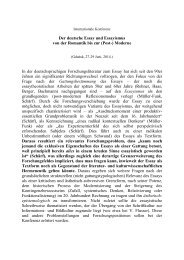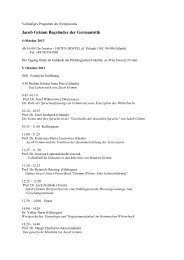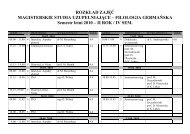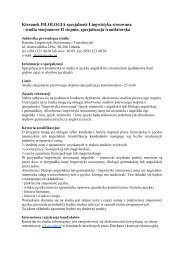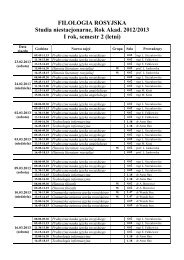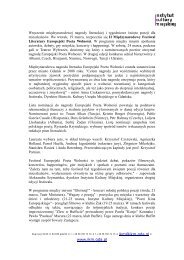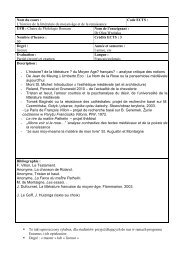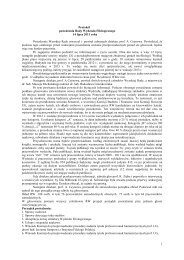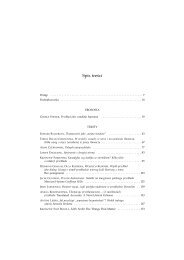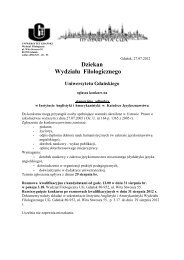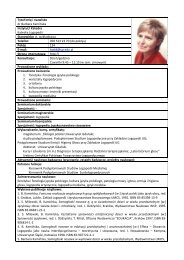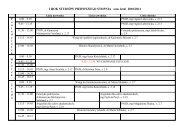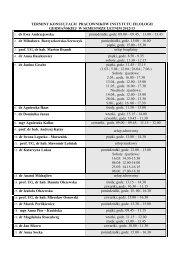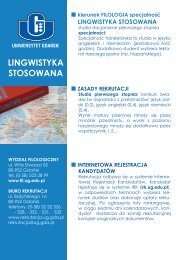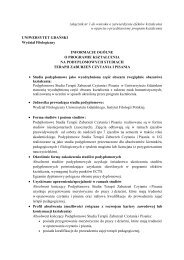Studia I stopnia, filologia angielska, specjalizacja nauczycielska (III ...
Studia I stopnia, filologia angielska, specjalizacja nauczycielska (III ...
Studia I stopnia, filologia angielska, specjalizacja nauczycielska (III ...
You also want an ePaper? Increase the reach of your titles
YUMPU automatically turns print PDFs into web optimized ePapers that Google loves.
Seminaria licencjackie: oferta w roku akademickim 2011/2012<br />
<strong>Studia</strong> I <strong>stopnia</strong>, <strong>filologia</strong> <strong>angielska</strong>, <strong>specjalizacja</strong> <strong>nauczycielska</strong> (<strong>III</strong> BA)<br />
dr Mirosława Modrzewska<br />
Program zajęć:<br />
Omówienie przykładowych tekstów z zakresu literatury romantycznej i jej związków z<br />
literaturą wcześniejszych epok: Analizy wybranych dramatów Williama Shakespeara’a<br />
Analizy porównawcze romantycznych dramatów G.G. Byrona i jego związków z dramatami<br />
epoki elżbietańskiej i tzw. Jacobean drama oraz utworami Johna Miltona Omówienie roli<br />
twórczości G.G. Byrona w literaturze polskiej i europejskiej (polski bajronizm od<br />
Mickiewicza po czasy współczesne) Omówienie roli innych romantyków brytyjskich w<br />
literaturze polskiej (przekłady polskie Roberta Burnsa, Walter Scott a powieści Henryka<br />
Sienkiewicza, etc.)<br />
Discussion of literary and dramatic texts selected from the area of British Romanticism<br />
Analysis of Romantic drama and its references to Elizabethan and Jacobean drama<br />
Analyses of chosen dramas by William Shakespeare Comparative analyses of dramatic<br />
texts by G.G. Byron and their relationship to Elizabethan and Jacobean drama, as well as<br />
poetic works by John Milton Discussion on the role of G.G. Byron In English, Polish and<br />
European literature (e.g. The phenomenon of Polish Byronism from the time of A.<br />
Mickiewicz till recent times) Discussion of the role of British Romantics in Polish Culture<br />
(Polish translations of Robert Burns, Walter Scott and the novels by Henryk Sienkiewicz,<br />
etc.)<br />
Literatura:<br />
W. Shakespeare, trzy wybrane dramaty, wybrane teksty z twórczości G.G. Byrona, np.<br />
Manfred, Cain, Heaven and Earth, Sardanapalus., R. Burns, Tam O’Shanter ,W. Scott,<br />
Waverley<br />
Wymagania i forma zaliczenia:<br />
Aktywny udział w dyskusjach zarówno nad pracą pozostałych studentów, jak i własną.<br />
Terminowe pokazanie pracy na każdym etapie jej powstawania. Trzymanie się zasad:<br />
składa się pracę do sprawdzania etapowo, nie w całości na końcu roku; składa się do<br />
sprawdzania wyłącznie wydruk; przy złożeniu każdego kolejnego opracowania danej<br />
części pracy składa się również poprzednią wersję z uwagami prowadzącej. Studenci,<br />
którzy zdecydują się na pisanie pracy licencjackiej z zakresu twórczości George’a
Gordona będą mogli włączyć się do działań International Byron Society i wziąć udział w<br />
dorocznych studenckich konferencjach byronowskich w Messolongi (Grecja) oraz w<br />
Wielkiej Brytanii (Liverpool and Edge HIll University, 23.03.2012.) Essential requirements<br />
for credit include reading all texts recommended in the course of the meetings, attendance<br />
at the seminars and active participation in discussion. Students are expected to take a<br />
lively interest not only in their own chosen subject but in the work of other students at<br />
every stage of its development. By the end of October 2011, students must have chosen<br />
their topic. Till the end of the semester they should all present a short account of it, both in<br />
writing and orally during the seminar meetings. Students who decide to write their thesis<br />
on the literary works of George Gordon Byron will be invited to take part in the activities of<br />
International Byron Society and take part in the students’ Byron conferences at Messolongi<br />
(Greece) and Great Britain (Liverpool and Edge HIll University, 23.03.2012.)
dr Michał Golubiewski<br />
Seminarium licencjackie językoznawczo-kulturoznawcze przeznaczone jest dla osób<br />
zainteresowanych językiem angielskim w kontekście kulturowym, społecznym,<br />
komunikacyjnym i globalnym. Nacisk położony jest na treści praktyczne oraz własne<br />
badania językowe. Kontakt: mgolubiewski@vp.pl. Więcej na stronie<br />
www.soclex.fil.ug.edu.pl.<br />
TEMATYKA dotyczy podstawowych odmian języka angielskiego (geograficznych,<br />
społecznych, zawodowych, stylistycznych historycznych) oraz ich opisu, a także projektów<br />
socjolingwistyczno-leksykograficznych realizowanych przez zespół badawczy prof.<br />
Widawskiego, m.in. Slangu studentów Uniwersytetu Gdańskiego oraz Leksyki<br />
angielszczyzny globalnej.<br />
ZAGADNIENIA, z których studenci piszą prace to np. angielszczyzna afroamerykańska,<br />
akcent nowojorski, angielszczyzna iberoamerykańska, slang w kulturze popularnej,<br />
neologizmy w mediach, zapożyczenia leksykalne, kultura hip-hopowa, tabu w języku i<br />
kulturze, język brytyjskich seriali TV, żargon i terminologia specjalistyczna, język a płeć,<br />
mikrostruktura słowników.
Prof. UG dr hab. David Malcolm<br />
Głównym celem seminarium jest przygotowaniem pracy licencjackiej. Obszar tematyczny<br />
seminarium obejmuje literaturę brytyjską, irlandzką i amerykańską (oprócz dramatu) XIX,<br />
XX oraz XI wieku. Tematy z filmoznawstwa lub z elementami literatury porównawczej<br />
zostaną uwzględnione. Studenci spędzą rok akademicki w ustaleniu, badaniu i<br />
zrealizowaniu wybranego tematu.<br />
The main aim of this year-long seminar is to enable students to write an acceptable praca<br />
licencjacka. The range of topics considered is likely to relate to British, Irish and US<br />
literature of the nineteenth, twentieth and twenty-first centuries (excluding drama). Topics<br />
in film studies may also be considered. Topics in comparative literature are welcome.<br />
Students will spend the year developing their topics, researching them, and writing their<br />
dissertations.
<strong>Studia</strong> I <strong>stopnia</strong>, <strong>filologia</strong>, amerykanistyka (<strong>III</strong> BA)<br />
dr Grzegorz Welizarowicz<br />
The seminar is dedicated to developing individual research projects of students working<br />
towards their BA thesis in the American Studies Program.<br />
Areas of interest include American literature, culture, history, society, American politics,<br />
etc. Students will be introduced to the techniques of writing and the rules of citation. A list<br />
of topics will be proposed but individual interests will be encouraged. Keeping a steady<br />
development of the research and writing throughout the whole year is of utmost<br />
importance therefore deadlines for mid-term and the term papers have been set. (See<br />
below) Keeping the deadlines is of utmost importance! Late papers will be deducted two<br />
points per day. Failure to keep a deadline might result in jeopardizing chances for course<br />
completion. Weekly attendance at the seminar and weekly reports on the project's<br />
progress are obligatory. Failure to attend seminars and keep deadlines may result in the<br />
expulsion from the seminar. Students are expected to have completed their dissertations<br />
by June 01, 2012.<br />
GRADES AND EVALUATION<br />
− Long oral project – for each class a different student (or students) will be asked to<br />
prepare a class presentation on a their project. Outlines of the presentation must be<br />
distributed among other students on the day of the presentation.<br />
− Short and longer writing assignments including two mid-term papers and two term<br />
papers.<br />
− MID-TERM WINTER SEMESTER PAPER due NOVEMBER 25, 2012.<br />
− WINTER SEMESTER FINAL PAPER due JANUARY 20, 2012.<br />
− MID-TERM SUMMER SEMESTER PAPER due APRIL 05, 2012.<br />
− SUMMER SEMESTER PAPER due MAY 25, 2012.<br />
ALL PAPERS HAVE TO CONFORM TO THE FOLLOWING STANDARDS:<br />
Font 12, Times New Roman, double spaced, do not justify texts.<br />
writing skills reference book:<br />
MLA Handbook for Writers of Research Papers. 7th edition or later. Modern Language<br />
Association.
dr Arkadiusz Misztal<br />
Celem kursu jest ukierunkowanie oraz pomoc seminarzystom w przygotowaniu prac<br />
licencjackich. Seminarium poświęcone jest zagadnieniom z literatury amerykańskiej<br />
dwudziestego wieku, a zwłaszcza ze współczesnej prozy amerykańskiej. Celem kursu jest<br />
ukierunkowanie oraz pomoc seminarzystom w przygotowaniu prac dyplomowych.<br />
Szczegółowa tematyka zajęć jest uzależniona od wyboru zagadnień, autorów oraz<br />
aspektów ich twórczości, dokonanych przez studentów na początku pierwszego semestru.<br />
W czasie kursu przewidziane są analizy i interpretacje przykładowych tekstów z literatury<br />
amerykańskiej i teorii literatury.<br />
Literatura:<br />
Baym, Nina. ed. Norton Anthology of American Literature. New York: W.W. Norton, 1989.<br />
Con Davis, Robert. ed. Contemporary Literary Criticism. New York: Longman, 1986.<br />
Culler, Jonathan. Literary Theory: A Very Short Introduction. New York: Oxford University<br />
Press, 1997.<br />
Eagleton, Terry. Literary Theory – An Introduction. Minneapolis and London: U of Minnesota<br />
Press, 1983.<br />
Gibaldi, Joseph. MLA Handbook for Writers of Research Papers. 5 th ed. New York: Modern<br />
Language Association of America, 1999.<br />
Hart, James D. The Oxford Companion to American Literature. New York: Oxford University<br />
Press, 1984.<br />
Horton, Rod W., and Herbert W. Edwards. Backgrounds of American Literary Tradition.<br />
New Jersey: Prentice-Hall, Inc., 1952.<br />
Sim, Stuart. ed. The Routledge Critical Dictionary of Postmodern Thought. New York:<br />
Routledge, 1999.
dr Małgorzata Lisiewicz<br />
Touching Infinity. Romantic tradition in the history of art of the United States.<br />
The task of the seminar is to analyze selected artistic phenomena of the 19 th and 20th<br />
century in the United States from the point of their reference to the Romantic tradition. The<br />
students will be invited to define the specificity of the Romantic worldview on American<br />
ground as expressed in painting of the first half of the 19th century, as well as to identify<br />
other aspects of the American past and contemporary visual culture that were possibly<br />
informed by the Romantic mentality/ ideology. The aim of the course is to consider the<br />
importance and vitality of the Romantic tradition in the United States.<br />
Course requirements:<br />
- Participation in classes<br />
- Students are required to attend meetings prepared (some reading material will be<br />
provided, but students will also be requested to search individually for academic<br />
materials).<br />
- Up to two unexcused absences are accepted per semester.<br />
- At least one presentation per semester<br />
- Writing a diploma paper on a specific aspect of the course’s theme (chosen by the<br />
student) including bibliographical resources.
<strong>Studia</strong> I <strong>stopnia</strong>, <strong>filologia</strong> <strong>angielska</strong>, <strong>specjalizacja</strong> translatoryczna (<strong>III</strong> BA)<br />
dr Filip Rudolf<br />
Przekład literacki – współczesna powieść anglojęzyczna XX i XXI wieku<br />
W ramach seminarium studenci piszą pracę dotyczącą przekładu literackiego z<br />
języka angielskiego na język polski lub z języka polskiego na język angielski z szerokiego<br />
zakresu obejmującego przekłady prozy anglosaskiej XX i XXI wieku. Obszar badań<br />
obejmuje:<br />
− literaturę piękną,<br />
− powieść sensacyjną,<br />
− powieści science-fiction i fantasy<br />
− esej literacki<br />
Podczas seminarium studenci zapoznają się z metodologią pisania pracy<br />
licencjackiej, jak również sposobami wykorzystywania źródeł internetowych.<br />
W ramach pisania pracy licencjackiej studenci dokonują wszechstronnej analizy<br />
krytycznej istniejącego już przekładu wybranej powieści anglojęzycznej (brytyjskiej,<br />
amerykańskiej, kanadyjskiej, australijskiej, itp.), porównują istniejące przekłady danego<br />
dzieła, bądź też proponują własną wersję przekładu (który mogą porównać z istniejącym<br />
tłumaczeniem / tłumaczeniami).<br />
Rzecz jasna dopuszczalne są również inne propozycje, choć oczywiście nie<br />
gwarantuję akceptacji wszelkich pomysłów.<br />
Wymagania dotyczące pracy licencjackiej:<br />
Długość: 35 stron.<br />
Bibliografia: 20 pozycji<br />
Styl zapisu: APA citation style:<br />
http://www.liu.edu/cwis/cwp/library/workshop/citapa.htm<br />
Terminy: wybór tematu i tytułu do 10 listopada 2011 r.<br />
Oddanie całości pracy: do 15 kwietnia 2012 roku.<br />
ZALECANE LEKTURY (wybór):<br />
J. Boase-Beier ‘Stylistic Approaches to Translation’<br />
A. Chesterman ‘Memes of Translation’<br />
R. Lewicki ,,Konotacja obcości w przekładzie”<br />
R. Lewicki ,,Obcość w odbiorze przekładu”<br />
R. Leppihalme ‘Culture Bumps’<br />
T. Parks ‘A Literature Approach to Translation – a Translation Approach to Literature’<br />
Lipiński ,,Mity przekładoznawstwa”<br />
O. Wojtasiewicz ,,Wstęp do teorii tłumaczenia”<br />
T. Hermans ‘The Conference of Tongues’<br />
K. Hejwowski ‘Translation: A Cognitive Communicative Approach‘<br />
G. Steiner ‘After Babel’
dr Ross Aldridge<br />
Seminarium licencjackie: language, culture and translation<br />
This diploma seminar is aimed at those students who wish to write their dissertations on<br />
the topic of translation problems that arise from cultural differences and issues related to<br />
intercultural communication. The primary focus will be on the translation of general non-<br />
fiction texts (although a few literary texts may also be used). Students will be allowed to<br />
choose their own specific texts to work on (with approval), but the dissertation should<br />
concentrate on theoretical and practical approaches to solving translation issues that are<br />
created by the cultural context of either the source text, the target language, or both. In the<br />
first semester, the seminars will guide students through the practical requirements of<br />
writing a diploma dissertation, as well as discussions of key theoretical issues related to<br />
intercultural communication and translation. Before the end of the winter semester every<br />
student will be required to make a short presentation on their chosen topic, as well as<br />
submit a brief outline of their proposed dissertation and a draft bibliography of relevant<br />
primary and secondary sources. In the second semester there will be an opportunity to<br />
receive detailed feedback and advice from both your supervisor and peers as you progress<br />
in writing the drafts of your dissertation.
Seminaria magisterskie: oferta w roku akademickim 2011/2012<br />
<strong>Studia</strong> stacjonarne II-go <strong>stopnia</strong>, <strong>filologia</strong>, amerykanistyka (I MA)<br />
Prof. UG dr hab. Andrzej Ceynowa<br />
„Dramat i powieść amerykańska XX wieku”<br />
Na seminarium skoncentrujemy się na amerykańskim dramacie i powieści XX wieku, ze<br />
szczególnym uwzględnieniem ostatnich 50 lat. Zajmiemy się współczesnymi poetykami<br />
dramatu i powieści jak również aktualnie popularnymi podejściami do analizy i interpretacji<br />
utworów. Omawiane będą przede wszystkim te, które budzą wśród seminarzystów<br />
największe zainteresowanie. Seminarium ma przygotować studentów do napisania pracy<br />
magisterskiej. Studenci zapoznają się ze współczesnymi metodami badawczymi,<br />
wykorzystaniem internetowych źródeł informacji naukowej oraz metodologią pisania prac<br />
naukowych. Do końca pierwszego semestru seminarzyści powinni zaproponować temat<br />
swojej pracy magisterskiej i przedstawić wstępną bibliografię do pracy. Zaliczenie<br />
semestru drugiego będzie uzależnione przede wszystkim od <strong>stopnia</strong> zaawansowania<br />
pracy nad magisterką, czyli przedstawieniem rozwiniętej bibliografii, konspektu pracy lub<br />
jej planu i jednego rozdziału.
Prof. UG dr hab. Marek Wilczyński<br />
The seminar will predominantly focus on American fiction and poetry of the 19 th and 20 th<br />
centuries, although in individual cases well-motivated students will be allowed to work on<br />
topics related to drama and/or film. In the first year, each participant will be expected to<br />
give a 45-minute oral presentation of the chosen topic, which will be discussed by the<br />
whole group. Moreover, some first-year seminar meetings will be devoted to discussing<br />
literary and theoretical texts relevant to specific projects. At the end of the first year,<br />
students will be required to submit a detailed outline of the thesis, bibliography, and the<br />
first chapter. The format of the seminar is flexible and open to individual interests of the<br />
participants.
<strong>Studia</strong> stacjonarne II-go <strong>stopnia</strong>, <strong>filologia</strong>,ścieżka literaturoznawcza ( IMA)<br />
Prof. UG dr hab. Joanna Burzyńska<br />
British Novel : from modernity to postmodernity<br />
The seminar course will be devoted to the British Novel . It will primarily focus on the 20th<br />
and 21 st century British fiction though numerous references to the earlier representatives<br />
of the genre will be made as well.<br />
From metodological point of view, the novel will be seen as suspended between the<br />
sociological and philosophical attitudes characteristic of modernity such as empiricism ,<br />
faith that our varied , contingent forms of life and knowledge can be grounded in some<br />
single, ultimate principle and postmodern attitudes rejecting totality, rationality and seeing<br />
all forms of life as relative, made up of mere cultural convention and tradition.Although the<br />
concepts of modernity and postmodernity will constitute the most general point of<br />
reference, much attention will be given to the evolution of the corresponding aesthetic<br />
attitudes including, most notably, modernism and postmodernism. Last but not least, the<br />
novel will be perceived in its varied cultural contexts, not a self-regulating linguistic entity.<br />
General, philosophical and aesthetic considerations will undoubtedly help disambiguate<br />
and profitably describe the individual tratment of the issues like human identity , memory or<br />
attitude to history as well as the modes of textual discourse like narrativity, metaficionality,<br />
intertextuality, used by the British novelists.<br />
Students will also be offered a guidance as to the choice of the theoretical issues<br />
appropriate for the topic and assistance in finding materials for the dissertation.
Prof. dr hab. Jerzy Limon<br />
Seminarium poświęcone będzie teatrowi i dramatowi angielskiego renesansu, w ujęciu<br />
historycznym (literaturoznawczym) i teatrologicznym. Magistranci zapoznają się nie tylko z<br />
tekstami epoki (Szekspir i jego współcześni), ale i z jej tłem kulturowym i politycznym.<br />
Przejdą też podstawowe szkolenie w zakresie nauk pomocniczych, np. paleografii czy<br />
edycji tekstów. Prace teatrologiczne opierać się będą - do wyboru - o realizacje dramatów<br />
Szekspira i jego współczesnych, zarówno filmowych, teatralnych, telewizyjnych, jak i<br />
radiowych. Szczególną wagę przywiązywać się będzie do inscenizacji z ostatnich lat, co w<br />
połączeniu z solidną podstawą teoretyczną, może dać ciekawe wyniki badawcze.<br />
Oczekuje się, że na seminarium zapiszą się osoby interesujące się dramatem, teatrem i<br />
szeroko rozumianą sztuką.
<strong>Studia</strong> stacjonarne II-go <strong>stopnia</strong>, <strong>filologia</strong>,ścieżka językoznawcza ( IMA)<br />
Prof. UG dr hab. Maciej Widawski<br />
SEMINARIUM magisterskie językoznawczo-kulturoznawcze przeznaczone jest dla osób<br />
zainteresowanych językiem angielskim w kontekście kulturowym, społecznym,<br />
komunikacyjnym i globalnym. Nacisk położony jest na treści praktyczne oraz własne<br />
badania językowe. Rozmowy kwalifikacyjne na początku września. Kontakt:<br />
widawski@ug.edu.pl. Więcej na stronie www.soclex.fil.ug.edu.pl.<br />
TEMATYKA dotyczy głównie odmian języka angielskiego (geograficznych, społecznych,<br />
zawodowych, stylistycznych historycznych) oraz ich opisu, a także projektów<br />
socjolingwistyczno-leksykograficznych realizowanych przez zespół badawczy prof.<br />
Widawskiego, m.in. Slangu studentów Uniwersytetu Gdańskiego oraz Leksyki<br />
angielszczyzny globalnej.<br />
ZAGADNIENIA, z których studenci piszą prace to np. angielszczyzna afroamerykańska,<br />
akcent nowojorski, angielszczyzna kanadyjska, slang w kulturze popularnej, neologizmy w<br />
mediach, zapożyczenia leksykalne, kultura hip-hopowa, tabu w języku i kulturze, język<br />
brytyjskich seriali TV, żargon i terminologia specjalistyczna, słowniki dydaktyczne typu<br />
ESL/EFL, mikrostruktura słowników.<br />
PROF. WIDAWSKI to czołowy polski socjolingwista i leksykograf zajmujący się odmianami<br />
angielszczyzny oraz pionier studiów nad slangiem i jego przekładem. Badania prowadził<br />
m.in. na University of Tennessee i Columbia University. Autor 12 książek, w tym The<br />
Polish-English Dictionary of Slang (Hippocrene, New York) i The Dictionary of City Names<br />
in American Slang (Peter Lang, Frankfurt).
Prof. UG dr hab. Danuta Stanulewicz<br />
Warunki uzyskania zaliczenia<br />
Udział w zajęciach.<br />
Przygotowanie referatów (co najmniej 2).<br />
Postęp w pisaniu kolejnych części pracy magisterskiej.<br />
Zakres tematyki<br />
− Językoznawstwo materiałowe, porównawcze, korpusowe; socjolingwistyka; językoznawstwo<br />
stosowane.<br />
− Składnia, semantyka, pragmatyka.<br />
− Preferowane tematy: słownictwo (np. barw), metafory i metonimie, przestrzeń i czas<br />
w języku, język Internetu i innych mediów, akty mowy, Inne tematy także mile widziane.<br />
Program zajęć<br />
1. Przygotowanie pracy magisteskiej: Aspekty merytoryczne i techniczno-formalne<br />
− wybór tematu pracy<br />
− literatura – poszukiwanie, sporządzanie notatek, krytyczne opracowanie<br />
− układ pracy: porządek rozdziałów<br />
− sporządzanie przypisów i odnośników, cytaty<br />
− przygotowanie bibliografii<br />
− język pracy<br />
2. Metody pracy badawczej<br />
a. analiza korpusów<br />
b. analiza tekstów<br />
c. analiza zawartości słowników<br />
d. studium przypadku<br />
e. kwestionariusz<br />
f. eksperyment<br />
g. wywiad<br />
3. Wybrane tematy<br />
referaty z wybranych przez studentów zagadnień<br />
Requirements<br />
1. At least 2 presentations.<br />
2. Attendance.<br />
3. Progress in writing the MA thesis.<br />
Preferred topics<br />
Vocabulary (e.g. colour vocabulary), metaphor and metonymy, the language of the Internet<br />
and other media, time and space in language, speech acts.<br />
Other topics (preferably in a comparative perspective) in syntax, semantics, pragmatics,<br />
sociolinguistics and applied linguistics.<br />
Programme<br />
1. Writing the MA thesis (selecting the topic, bibliography, the structure of the thesis,<br />
footnotes, quotations, language etc.).<br />
2. Research methods (corpus analysis, text analysis, questionnaires, interviews, experiments<br />
etc.).<br />
3. Selected topics: Presentations.
<strong>Studia</strong> stacjonarne II-go <strong>stopnia</strong>, <strong>filologia</strong>,<strong>angielska</strong>, <strong>specjalizacja</strong><br />
translatoryczna (I MA)<br />
dr Justyna Giczela-Pastwa<br />
The seminar will focus on the theory and practice of translating specialised texts,<br />
especially legal and quasi-legal ones. In the first stage, participants will mostly build on and<br />
consolidate their knowledge of selected contemporary translation theories and appropriate<br />
research methodologies. Moreover, discussions during the seminar group meetings will<br />
concentrate on such issues as (the language-specific and culture-specific difficulties in)<br />
achieving equivalence in LSP translation, translating terminology, strategies and<br />
techniques applied in the case of translating LSP texts, using corpora in translation studies<br />
etc. Following the introductory stage, students will prepare research proposals and work<br />
on individual MA projects, preferably devoted to subject matters discussed in the<br />
framework of the seminar.<br />
Essential reading (TBA):<br />
Baker, M. (ed.). 1998/2001. Routledge Encyclopedia of Translation Studies. London, New<br />
York: Routledge.<br />
Hatim, B., Munday, J. 2004. Translation. An Advanced Resource Book. London, New York:<br />
Routledge.<br />
Venuti, L. (ed.). 2004. The Translation Studies Reader. Second Edition. London, New York:<br />
Routledge.<br />
Williams, J., Chesterman, A. 2007. The Map: a Beginner’s Guide to Doing Research in<br />
Translation Studies. Manchester: St. Jerome Publishing.<br />
Alcaraz Varó, E., Hughes, B. 2002. Legal Translation Explained. Manchester: St. Jerome<br />
Publishing.<br />
selected articles from Meta, Babel, Journal of Specialized Translation, Translation Journal,<br />
Target
dr Olga Kubińska<br />
Course name – M.A. Seminar (Postcolonial Translation)<br />
Type – Seminar, obligatory<br />
Level – First year students (continued on the Second year), M.A. programme in English<br />
Philology, translation specialization, advanced<br />
Duration and credit – 60h<br />
Tutor – Olga Kubińska, Ph.D.<br />
Course description: objectives and content –<br />
The aim of the course is to prepare the students to write their M.A. theses in compliance<br />
with all the official regulations and traditional requirements.<br />
During the first two semesters the students are required to do much reading in postcolonial<br />
literatures in English and critical writings on postcolonial texts. Focus is on literary texts<br />
from India, Canada, writings of immigrants in Britain and a selection of English language<br />
prose from Africa. The second domain of extensive reading is theory of postcolonial<br />
culture, combined with the complex problems of translation of postcolonial literatures.<br />
The second semester is also devoted to the pursuit of appropriate topics for future M.A.<br />
theses. The students are required to specify the range of subjects to be covered in their<br />
research. Students either analyze existing translations or prepare their own translations<br />
(circa 50 pages) of chosen texts and analyze translation strategies in accordance with the<br />
methodology of their choice.<br />
There also exists the possibility of cotranslation of postcolonial literature; in such instances<br />
students can additionally explore the phenomena which underlie cotranslation of belles<br />
lettres.<br />
The objectives pursued within the course: ability to select and mine information in chosen<br />
domains, potential for teamwork, multimedia presentations of own work, data search in the<br />
Internet and printed sources, management of databases within such systems as VPN,<br />
Jstor, EBSCO, Scholar Complete, Google Scholar. Proficiency in critical and theoretical<br />
literature, ability to utilize printed holdings of such libraries as BUG (main library of the<br />
University of Gdańsk), Bhum UG (library of the School of Languages at the University of<br />
Gdańsk), Międzyuczelniana Wypożyczalnia (Interlibrary Loan System), etc.<br />
Literature<br />
A/<br />
House, Juliane, Translation, Oxford, OUP 2010<br />
Bassnett, Susan and Harish Trivedi (eds.), Postcolonial Translation. Theory and Practice,<br />
Routledge, London, London and New York 1999<br />
Heaney, Seamus, „O przekładzie Beowulfa”, trans. Olga i Wojciech Kubińscy,<br />
Przekładalne <strong>III</strong>. O wierności, Olga and Wojciech Kubiński (eds.), Gdańsk, Wydawnictwo<br />
Uniwersytetu Gdańskiego 2007, s. 275-293.<br />
Steiner, George, “przekład jako conditio humana”, trans. Olga i Wojciech Kubińscy,<br />
Przekładalne <strong>III</strong>. O wierności, Olga and Wojciech Kubiński (eds.), Gdańsk, Wydawnictwo<br />
Uniwersytetu Gdańskiego 2007, s. 19-39.<br />
Tymoczko, Maria, “Literatura postkolonialna i przekład literacki”, tłum. Agata Sadza,<br />
Współczesne teorie przekładu. Antologia, Piotr Bukowski and Magda Heydel (eds.), Znak,<br />
Kraków: 2009, s.430-447<br />
B/Ashcroft, Bill, Gareth Griffiths and Helen Tifflin (eds.), The Post-Colonial Studies<br />
Reader, Routledge: London 2011<br />
Ashcroft, Bill, Gareth Griffiths and Helen Tifflin, The Empire Writes Back. Theory and<br />
Practice in post-colonial literatures, Routledge, London 2002<br />
McLeod, John, Postcolonial London. Rewriting the metropolis, Routledge, New York 2004
Pym, Anthony, Exploring Translation Theories, Routledge, New York 2010<br />
Suleri, Sara, The Rhetoric of English India, The University of Chicago Press, Chicago 1992<br />
Talib, Ismail, S., The Language of Postcolonil Literatures, Routledge, London 2002<br />
Nazwa kursu – seminarium magisterskie (Przekład Postkolonialny)<br />
Poziom – studenci pierwszego roku studiów II <strong>stopnia</strong> (kontynuacja na drugim roku),<br />
program magisterski na Filologii Angielskiej, <strong>specjalizacja</strong> translatoryczna, poziom<br />
zaawansowany<br />
Długość kursu – 60 godzin<br />
Prowadząca – dr Olga Kubińska<br />
Opis kursu: cele i treści nauczania<br />
Zasadniczym celem kursu jest przygotowanie studentów do napisania prac magisterskich<br />
spełniających wszystkie oficjalne wymogi oraz tradycyjne kryteria.<br />
W trakcie pierwszego i drugiego semestru seminarium zadaniem studentów jest obszerne<br />
oczytanie w dziedzinie badań nad literaturą postkolonialną, połączone z koniecznością<br />
poznania najciekawszych przykładów prozy postkolonialnej obszaru anglojęzycznego (z<br />
naciskiem na literaturę Indii, Kanady, literatury emigrantów mieszkających w Wielkiej<br />
Brytanii oraz przykłądy anglojęzycznych literatur afrykanskich). Drugim obszarem<br />
oczytania jest teoria kultury postkolonialnej, połączona z kwestią przekładu literatur<br />
postkolonialnych.<br />
Drugi semestr przeznaczony jest również na przygotowanie tematu pracy magisterskiej i<br />
określenie jej zakresu: studenci albo analizują istniejące tłumaczenie albo sami<br />
przygotowują przekład (50 stron) wybranego tekstu i analizują strategie translatorskie<br />
zgodnie z przyjętą metodologią. Istnieje możliwość pracy nad współprzekładem literatury<br />
postkolonialnej; w takim wypadku studenci mają dodatkową możliwość badania zjawiska<br />
współprzekładu literatury pięknej.<br />
Cele: umiejętność zdobywania i gromadzenia informacji w opanowywanej dziedzinie,<br />
budowa umiejętności pracy w zespole, prezentacji multimedialnej własnych osiągnięć,<br />
poszukiwanie danych w internecie i materiałach drukowanych,opanowanie baz danych<br />
dostępnych przez system VPN, Jstor, EBSCO, Scholar Complete, Google Scholar.<br />
Znajomość literatury krytycznej i teoretycznej, rozpoznanie zasobów drukowanych<br />
dostępnych w BUG, Bhum UG, Międzyuczelnianą Wypożyczalnię, etc.<br />
Wymagania na zaliczenie: I semestr: zaliczone kolokwium z wyznaczonej bibliografii; II<br />
semestr: przygotowanie konspektu pracy, gotowy przekład własny.<br />
Literatura<br />
House, Juliane, Translation, Oxford, OUP 2010<br />
Bassnett, Susan and Harish Trivedi (eds.), Postcolonial Translation. Theory and Practice,<br />
Routledge, London, London and New York 1999<br />
Heaney, Seamus, „O przekładzie Beowulfa”, przekł. Olga i Wojciech Kubińscy,<br />
Przekładalne <strong>III</strong>. O wierności, pod red. Olgi i Wojciecha Kubińskich, Gdańsk, Wydawnictwo<br />
Uniwersytetu Gdańskiego 2007, s. 275-293.<br />
Steiner, George, “przekład jako conditio humana”, przekł. Olga i Wojciech Kubińscy,<br />
Przekładalne <strong>III</strong>. O wierności, pod red. Olgi i Wojciecha Kubińskich, Gdańsk, Wydawnictwo<br />
Uniwersytetu Gdańskiego 2007, s. 19-39.<br />
Tymoczko, Maria, “Literatura postkolonialna i przekład literacki”, tłum. Agata Sadza,<br />
Współczesne teorie przekładu. Antologia, pod red. Piotr Bukowski i Magda Heydel, Znak,<br />
Kraków: 2009, s.430-447<br />
B/Ashcroft, Bill, Gareth Griffiths and Helen Tifflin (eds.), The Post-Colonial Studies<br />
Reader,
prof. UG dr hab. Wojciech Kubiński<br />
Course name – M.A. Seminar (Audiovisual Translation)<br />
Type – Seminar, obligatory<br />
Level – First year students (continued on the Second year), M.A. programme in English<br />
Philology, translation specialization, advanced<br />
Duration and credit – 60h<br />
Tutor – Professor Wojciech Kubiński<br />
Course description:<br />
objectives and content –<br />
The sole aim of the course is to prepare the students to write their M.A. theses in<br />
compliance with all the official regulations and traditional requirements. The M.A. project<br />
involves translating soundtracks from assorted audiovisual materials (films, TV<br />
productions, etc.). The students must learn how to operate a computer programme for<br />
subtitling. The final work comprises a recorded version of the subtitled material, a transcript<br />
of all the translated dialogues, a theoretical part based on the available literature on audiovisual<br />
translation and an analytical part in which the student discusses problems<br />
connected with the subtitling task. This analysis should particularly focus on those aspects<br />
of the translation project which involve omissions which characterize this mode of<br />
translation, i.e. which elements from the original soundtrack did not find their way to the<br />
subtitles.<br />
Objectives: translation into English of the original soundtrack from a documentary film,<br />
motion picture, TV production, etc., production of a subtitled version of the material,<br />
analysis of the translation options and problems. What is particularly valuable in this<br />
project is that the students would participate in a real translation venture and thereby<br />
would receive “hands-on” translation experience.<br />
Assessment – a formal review of the project produced by two referees and a final oral<br />
examination in front of a panel consisting of the two referees and a chairperson.<br />
Literature<br />
Baker, Mona (ed.). 1998. Routledge Encyclopedia of Translation Studies. London and New<br />
York: Routledge.<br />
Chiaro, Delia, Christine Heiss and Chiara Bucaria (eds.). 2008. Between Text and Image.<br />
Updating research in screen translation. Amsterdam and Philadelphia: John<br />
Benjamins.<br />
Diaz Cintas, Jorge (ed.). The Didactics of Audiovisual Translation. Amsterdam and<br />
Philadelphia: John Benjamins.<br />
Kuhiwczak, Piotr and Karin Littau (eds.). 2007. A Companion to Translation Studies.<br />
Clevedon: Multilingual Matters.<br />
Orero, Pilar (ed.). 2004. Topics in Audiovisual Translation. Amsterdam and Philadelphia:<br />
John Benjamins.<br />
Snell-Hornby, Mary, Zuzanna Jettmarova and Klaus Kaindl (eds.). 1997. Translation as<br />
Intercultural Communication. Amsterdam and Philadelphia: John Benjamins.<br />
Venuti, Lawrence (ed.). 2000/2004. The Translation Studies Reader. London: Routledge.
Nazwa kursu – seminarium magisterskie (Przekład Audiowizualny)<br />
Poziom – studenci pierwszego roku studiów II <strong>stopnia</strong> (kontynuacja na drugim roku),<br />
program magisterski na Filologii Angielskiej, <strong>specjalizacja</strong> translatoryczna, poziom<br />
zaawansowany<br />
Długość kursu – 60 godzin<br />
Prowadzący – Profesor UG, dr hab. Wojciech Kubiński<br />
Opis kursu: cele i treści nauczania<br />
Zasadniczym celem kursu jest przygotowanie studentów do napisania prac magisterskich<br />
spełniających wszystkie oficjalne wymogi oraz tradycyjne kryteria. Projekt pracy obejmuje<br />
autorski przekład ścieżki dźwiękowej pochodzącej z dowolnego materiału audiowizualnego<br />
(film dokumentalny lub fabularny, program telewizyjny, itp.). Dodatkowym celem jest<br />
opanowanie przez studentów komputerowego oprogramowania służącego do<br />
sporządzenia napisów. Ostateczna praca składa się z zapisu opatrzonego napisami<br />
materiału, transkrypcji przełożonych dialogów, części teoretycznej opartej na literaturze<br />
poświęconej przekładowi audiowizualnemu oraz części analitycznej, w której autor pracy<br />
omawia problemy związane z przygotowaniem napisów. Analiza ta powinna szczególnie<br />
koncentrować się na tych aspektach zadania tłumaczeniowego, które wiążą się<br />
koniecznością opuszczenia pewnych fragmentów pierwotnego tekstu, tj. na tych<br />
elementach pierwotnej ścieżki dźwiękowej, które nie znalazły się w ostatecznych napisach.<br />
Cele: przekład oryginalnej ścieżki dźwiękowej dowolnego materiału audiowizualnego,<br />
przygotowanie własnej wersji tego materiału zaopatrzonej profesjonalnymi napisami,<br />
analiza opcji translatorskich oraz problemów tłumaczeniowych. Szczególną zaletą takiego<br />
projektu magisterskiego jest jego praktyczne ukierunkowanie.<br />
Ocena – formalne recenzje projektu napisane przez dwóch niezależnych recenzentów<br />
oraz końcowy egzamin ustny przed komisją złożoną z obu recenzentów i osoby<br />
przewodniczącej.<br />
Literatura<br />
Baker, Mona (red.). 1998. Routledge Encyclopedia of Translation Studies. London and<br />
New York: Routledge.<br />
Chiaro, Delia, Christine Heiss and Chiara Bucaria (red.). 2008. Between Text and Image.<br />
Updating research in screen translation. Amsterdam and Philadelphia: John<br />
Benjamins.<br />
Diaz Cintas, Jorge (red.). The Didactics of Audiovisual Translation. Amsterdam and<br />
Philadelphia: John Benjamins.<br />
Kuhiwczak, Piotr and Karin Littau (red.). 2007. A Companion to Translation Studies.<br />
Clevedon: Multilingual Matters.<br />
Orero, Pilar (red.). 2004. Topics in Audiovisual Translation. Amsterdam and Philadelphia:<br />
John Benjamins.<br />
Snell-Hornby, Mary, Zuzanna Jettmarova and Klaus Kaindl (red.). 1997. Translation as<br />
Intercultural Communication. Amsterdam and Philadelphia: John Benjamins.<br />
Venuti, Lawrence (red.). 2000/2004. The Translation Studies Reader. London: Routledge.
<strong>Studia</strong> niestacjonarne II-go <strong>stopnia</strong>, <strong>filologia</strong> ( IMA)<br />
dr Andrzej Cirocki<br />
MA Seminar: Teaching and Learning a Foreign Language.<br />
The goal of this course is to prepare students for the task of writing an MA dissertation.<br />
Some sessions are aimed at familiarising students with the technical aspects of written<br />
academic discourse. Other sessions are meant to help students to construct a personal<br />
understanding of the interdisciplinary field of SLA. Since this course is mainly designed for<br />
EFL teachers, central areas of foreign language learning/acquisition as well as major<br />
trends in teaching English to primary andsecondary school students will be critically<br />
analysed and constructively discussed. The topics covered in this unit will include: theories<br />
of language learning andteaching, classroom research, materials development, CALL,<br />
testing and assessment,curriculum and syllabus design, language learning strategies,<br />
literature in thelanguage classroom, CLIL and learner autonomy. The final mark will be<br />
based on individual and group reports/projects/presentations,<br />
portfolios of self-designed materials, a dissertation proposal and regular<br />
attendance (80%).
dr Tomasz Wiśniewski<br />
Współczesny dramat brytyjski i irlandzki<br />
Seminarium Współczesny dramat brytyjski i irlandzki skierowane jest do słuchaczy<br />
uzupełniających studiów magisterskich w trybie zaocznym. W centrum zainteresowań jest<br />
tu komunikacja literacka ze szczególnym uwzględnieniem relacji pomiędzy dialogiem,<br />
monologiem a solilokwium. Istotną rolę odgrywa analiza zależności konwencji<br />
dramatycznych od konwencji teatralnych. Uczestnicy seminarium analizują i porównują<br />
grupę wybranych tekstów dramatycznych (trzech – czterech dramatów wybranego autora)<br />
w ujęciu strukturalistycznym i semiotycznym. Cezura czasowa obejmuje końcówkę XIX<br />
wieku po czasy nam współczesne. Głównym celem zajęć jest zapoznanie studentów z<br />
wybranymi kierunkami ewolucji historycznej dramatu współczesnego.
dr Ewelina Gutowska-Kozielska<br />
This seminar is addressed to students interested in discourse analysis (language and<br />
gender, media, politics), communication studies, rhetoric and pragmatics, language and<br />
popular culture, and gender studies.<br />
Requirements:<br />
- 1 st semester :class presentation , short written assignments, presentation of the topic<br />
and a detailed plan of the dissertation<br />
- 2 nd semester -one chapter of the M.A. thesis<br />
Seminarium przeznaczone jest dla student interesujących się analizą dyskursu ( dyskurs<br />
polityki, mediów, jezyk i gender), naukami o komunikowaniu, retoryką i pragmatyką<br />
jezykowa, kulturą popular oraz społeczno-kulturową tożsamością płci.<br />
Wymagania:<br />
- 1szy semestr: prezentacja na zajęciach, przygotowanie krótkich tekstów pisemnych,<br />
określenie tematu i szczegółowego planu pracy magisterskiej<br />
- 2gi semestr - Napisanie pierwszego rozdziału pracy magisterskiej
Prof. UG dr hab. Jean Ward<br />
Zajęcia seminaryjne mają doprowadzić do powstania pracy magisterskiej z zakresu<br />
współczesnej literatury brytyjskiej. Najchętniej zajmę się pracami związanymi z<br />
dwudziestowieczną poezją brytyjską i irlandzką, (np. T. S. Eliota, R. S. Thomasa, Davida<br />
Jonesa, Seamusa Heaneya, Anne Stevenson), poezją religijną oraz przekładem<br />
poetyckim. Jeśli chodzi o prozę, propozycje związane z twórczością G. Greene’a, M.<br />
Spark, E. Waugh’a oraz C. S. Lewisa też będą mile widziane. Inne propozycje mogą być<br />
rozważane pod warunkiem, że wchodzą w zakres moich zainteresowań. Spotkania<br />
seminaryjne będą prowadzone w sposób wymagający od studentów żywe zainteresowanie<br />
nie tylko własną tematyką ale także pracą kolegów.<br />
The field of study in this seminar is contemporary British literature. I will be pleased to<br />
supervise dissertations connected with twentieth-century British and Irish poetry (e.g. T. S.<br />
Eliot, R. S. Thomas, David Jones, Seamus Heaney, Anne Stevenson), religious poetry and<br />
translation of poetry. As regards prose, proposals connected with the work of Graham<br />
Greene, Muriel Spark, Evelyn Waugh and C. S. Lewis will also be welcome. Other<br />
proposals may be considered provided that they enter into the field of my interests and<br />
competence. The seminar meetings will be conducted in a manner that requires<br />
participants to take an active interest in the work of other students as well as their own.
Kierunek i typ studiów;<br />
Specjalizacja<br />
Nr i nazwa przedmiotu<br />
/Tytuł kursu<br />
Rodzaj zajęć:<br />
seminarium<br />
Wykładowca<br />
dr Beata Karpińska-Musiał<br />
ANGLISTYKA 2 STOPNIA ZAOCZNE<br />
Ścieżka językoznawcza<br />
SEMINARIUM MAGISTERSKIE ECTS:<br />
Rok akademicki i semestr:<br />
2011/2012<br />
Liczba godzin:<br />
60<br />
Cel zajęć Seminar shall cover a wide scope of topics referring to the educational discourse which<br />
graduates of philological departments have to face in various ways both during their studies,<br />
and once they leave the academia.<br />
Program<br />
zajęć<br />
The aim of the course will be to make the students aware of plentiful phenomena that occur in<br />
the educational dialogue and are connected with the role, position, duties and competences of<br />
learners and teachers. The theoretical context of the discussion shall be teaching foreign<br />
languages, but in fact we will cross the borderline between methodology of FLT and social<br />
sciences, trying to look for wider social, psychological and philosophical contexts present in<br />
the foreign language classroom.<br />
MA dissertations may refer to language acquisition theories, methodology of teaching,<br />
linguistics, intercultural pedagogy, sociolinguistics and pragmatics.<br />
Seminarium magisterskie podejmuje tematykę szeroko rozumianego dyskursu edukacyjnego, z<br />
którego wieloma aspektami absolwenci studiów filologicznych stykają się zarówno podczas<br />
własnej edukacji, jak i w przyszłej rzeczywistości zawodowej.<br />
Celem zajęć jest zapoznanie studentów z szerokim spektrum zagadnień dotyczących zjawisk<br />
zachodzących we współczesnym dyskursie edukacyjnym, przekładającym się na definiowanie<br />
pozycji nauczyciela oraz ucznia, ich relacji, obowiązków, praw i kompetencji. Kontekstem<br />
teoretycznym jest przede wszystkim glottodydaktyka, jednak ukazana zostanie jej<br />
interdyscyplinarność, związek z naukami społecznymi oraz specyfika metodologii nauczania<br />
języka obcego wobec wymagań współczesnej rzeczywistości społeczno-kulturowej.<br />
Prace magisterskie dotyczyć mogą zarówno akwizycji języka, metodyki nauczania, tematyki<br />
językoznawczej, kulturoznawczej lub społecznych aspektów glottodydaktyki (socjolingwistyka,<br />
pragmatyka).<br />
1 semester<br />
MAIN ISSUES IN THE CONTEMPORARY EDUCATIONAL DISCOURSE<br />
FOREIGN LANGUAGE TEACHER AS AN ‘INTERCULTURAL SPEAKER’<br />
RHETORIC AND SUCCESS IN FOREIGN LANGUAGE TEACHING.<br />
KLUCZOWE PROBLEMY WE WSPÓŁCZESNYM DYSKURSIE EDUKACYJNYM<br />
NAUCZYCIEL JĘZYKÓW OBCYCH JAKO ‘INTERCULTURAL SPEAKER’<br />
RETORYKA A SUKCES DYDAKTYCZNY.<br />
2 semester<br />
METHODOLOGY OF RESEARCH IN GLOTTODIDATCIS AND PEDAGOGY.<br />
METODOLOGIA PRACY BADAWCZEJ W GLOTTODYDAKTYCE ORAZ PEDAGOGICE.
Literatura<br />
Wymagania i<br />
forma<br />
zaliczenia:<br />
Shall be provided during the course<br />
Formula and requirements for a passing grade:<br />
Titles and content of diploma papers should relate to the topic areas discussed in the seminar,<br />
but it is after all the students’ choice. Creativity and good ideas are most welcome!<br />
To pass a seminar, students need to attend the meetings (1 unexcused absence allowed in a<br />
semester) and meet the deadlines as to the subsequent parts of writing a thesis. Each student<br />
also needs to have one presentation in the first semester. Students must have their MA<br />
dissertations ready by the end of May 2012 to get a final passing grade.



